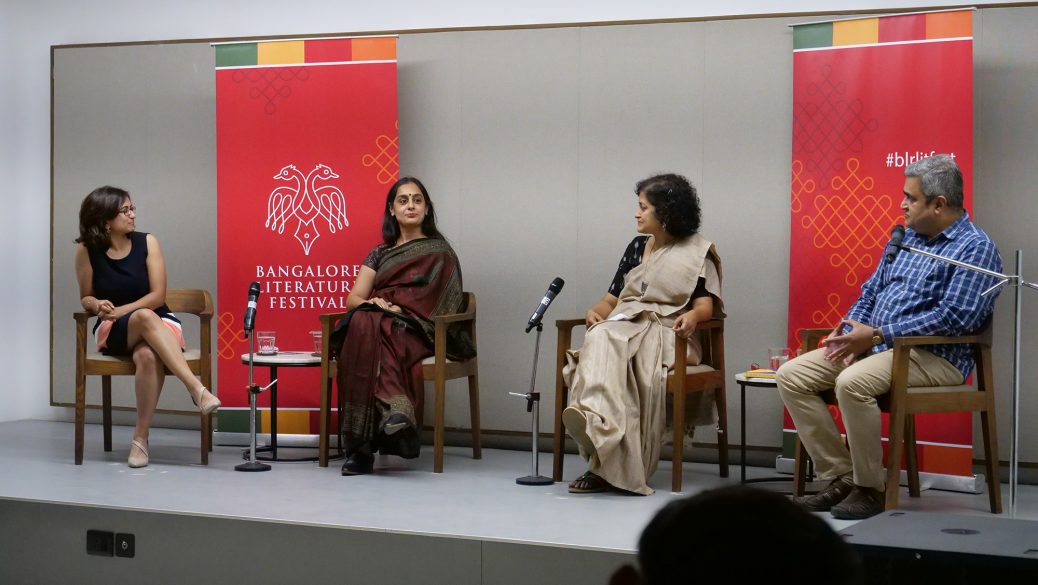Language and literature are common to everyone, and yet they stand out in the multitude of forms they come in. The session with Vivek Shanbhag and Karthik Venkatesh is a beautiful dissection of language, content and the magic it brings to its audience.
Vivek Shanbhag is a popular Kannada writer who has published five short story collections, three novels and two plays. Vivek also engrosses himself in translation, and editing. Moderating this session with Vivek is Karthik Venkatesh, a writer whose work lies in the realms of history, language, literature, and education.
Going all the way to the beginning, Karthik nudges Vivek to share how it all began. “Fond memories of his grandfather, a teacher, and Yakshagana”, Vivek says. Vivek began his literary exploration when he was a teenager, with Kannada. His reading habits panned magazines, and often brought out many questions from an inquisitive young Vivek. The second one of course, was Yakshagana. Vivek’s thought processes and influence on his literary interests were pretty much shaped by the art form which typically uses stories from mythology. Yakshagana trained Vivek to look at it as art, as one that describes and helps one imagine a complete scene around a lone dancer on stage. The avatars, and the artistes, though finite, the stories that Yakshagana brought to life were aplenty! The same story, every time that it was retold, brought in a very different depiction of the episode, akin to his grand-aunt’s storytelling, Vivek recounts. How the same story begins at a kitchen, when in a kitchen, or someone’s broken ankle intrigued Vivek.
Although educated to be an Engineer, Vivek’s interests still lay with literature, he answers Karthik. May be a page or two for writers today to relate, a day job as an engineer frees the writer in him. There are no rules, or deadlines, or pressure that a literary career may bring, but is used more like a release.
Karthik’s next question in tow was on the long-standing debate of how non-English speakers could write in English. Although Vivek writes in Kannada, a similar logic applies here, since Vivek comes from a household that speaks Konkani. A polyglot himself, Vivek attributes his ability to write in Kannada since he studied it as his first language in school. He brings it back to his reference of Yakshagana, and how every writer is at awe at what is written only after the deed, and the surprises are what keep it going. He acknowledges how all this is possible only when the writer knows the language, the ebb and flow of emotions and language is only possible when there is a strong hold on vocabulary. He also talks about how, vernacular language writing stands an advantage over English, since it is a language that the common person would understand. English, even today, is not universal in its use, or even in its unity with the daily life of a stranger, and therefore, may not do much justice. The usage of ‘paroksha’, a metaphor, could be extremely local to the culture that may get lost in translation.
While Vivek justifies this, he also recounts how a translated material from early in his career seemed to nullify its purpose. Using words that meant ‘training’ or ‘machinery’ in Kannada, when the experience associated with it was in English, sound superficial, or even artificial, he says. Not just the vocabulary of a language, but also the experience within that makes writing more personal and relatable.
Speaking of such experiences, Karthik brings to the fore the kind of literary movements that have taken place in the past. He recounts that nothing of the sort has happened in the recent past and questions if such a need arises today. Vivek believes that a movement may be helpful to pan the spotlight over to a certain direction, and yet, it remains a spotlight. The presence of the movement, as seen in the past, may throw relevant, brilliant writing into a dark corner while the focus only stays on some.
Karthik throws light on one such movement, ‘Nayiwali Hindi’, where the focus is on the ‘Hinglish’ writing today. Could there be a similar one for Kannada? Vivek negates it. A language like Kannada has seen a very successful amalgamation of languages in its literary history. In the works of legendary writers like Da Ra Bendre, we see Marathi words, and in some others, we see a whole different dialect! That, he says, is what makes it unique. The experience and exposure of a writer to a language is what makes a writing of a certain kind, and that, is no issue at all.
As an editor, Vivek says, that it excites him to be the first to read many different works. It also brings to him a new age of young writers. Yet, but not with much remorse, he comments on the lack of time.
Literature and translations, have humbled him. To work on a translation means going through multiple works in languages he had once thought he’d known, and that adds to the whole experience and the magic that writing brings him.
About the Author: A believer in the subtlety of magic in everyday living, and Shobhana seeks the same from the books she reads, and the poetry she writes. Immerses herself in music, literature, art, and looking out the window with some coffee. She curates her poetry, and occasional verses in her blog Thinking; inking. She currently writes for TheSeer.



